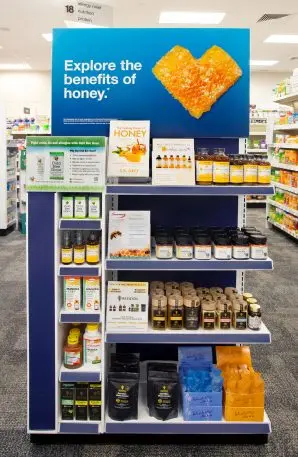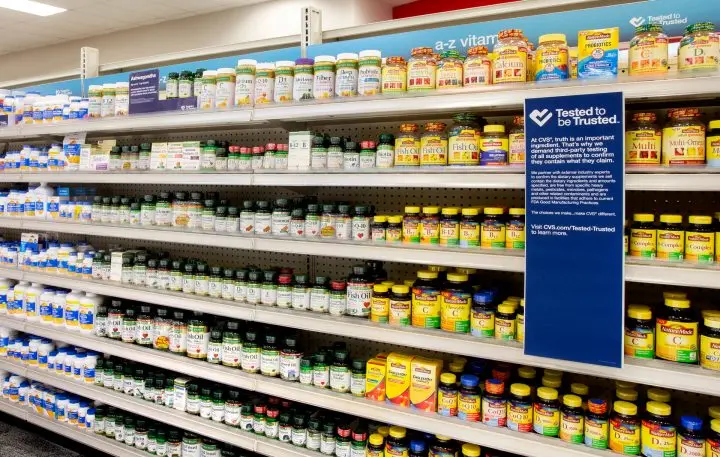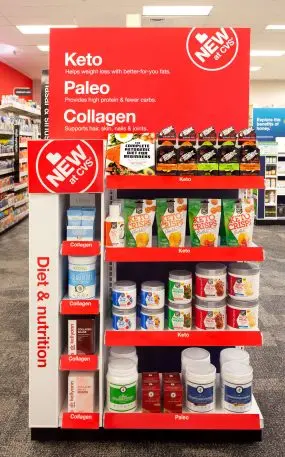CVS Pharmacy wants to offer a bit more clarity when it comes to navigating the supplement aisle. On Wednesday, the retail division of CVS Health unveiled “Tested to Be Trusted,” a new program requiring third-party testing of all vitamins and supplements sold in-store and online.
Starting this month, supplements will be verified to ensure the accuracy of listed ingredients as well as to confirm they are free of certain harmful additives. In total, the giant pharmacy retail chain sells 1,400 vitamins from 152 brands, spanning 11 categories like diet and pain relief.
Supplements notoriously lack the more rigorous regulations afforded to pharmaceutical drugs, sometimes veering into snake-oil territory. In 2015, the New York Attorney General’s office found that a strong percentage of dietary supplements contain suspicious ingredients not listed on the label. This past February, the FDA announced plans to strengthen oversight of the supplement market and its “potentially dangerous products.”

Currently, CVS Pharmacy is the only national retailer implementing regulations requiring third-party standards for supplements. So far, 7% of the supplements failed testing requirements, meaning their labels were updated or the products were pulled from shelves.
Related: What happened when I took a brain-boosting herbal supplement for a month
Supplements are now a booming $128-billion industry flush with newcomers like Goop, Brandless, and Hims. Fashion stores, pharmacies, even Sephora now sell “trendy” supplements that claim to fix issues relating to beauty, digestion, and hair growth.

“You’ve got 70-95% of all illnesses managed without a doctor, so people are taking things into their own hands,” says de Greve. “We want to make it easier for them.”
Roughly 75% of U.S. adults take dietary supplements, according to the CRN Consumer Survey on Dietary Supplements. Adult supplement use increased by 10% over the past decade, despite fierce debate over whether the majority of supplements fulfill their claims. Efficacy has long troubled researchers, nutritionists, and the medical establishment. In one recent study, researchers compared clinical trials over five years to determine whether regular vitamin intake improves one’s overall health and well-being. In evaluating multivitamins, as well as vitamin C, vitamin D, and calcium supplements, “none had a significant effect.”
CVS Pharmacy will ensure the safety of supplements, though that doesn’t mean it will verify quality or efficacy. The company doesn’t see that as their role; instead, it simply wants to be the more secure avenue for customers to explore their health options. “The first thing you have to do is follow what consumers are doing and what consumers are telling us they want,” de Greve says.” Whether those pills do anything? That’s another story.
“We want to make sure that there’s choice for the consumers,” he adds. “And if there are homeopathic remedies that some consumers value, then we want to make sure that those are available and we follow the FDA compliance policy under which those products can be sold.”
Consumers are increasingly drawn to homeopathic and nonconventional remedies, with two-thirds of Americans viewing alternative therapies as safe (69%) and effective (63%). But there are also those who criticize the mainstream legitimization of seemingly unverified supplements. Last year, the Center for Inquiry filed a lawsuit claiming CVS fraudulently deceived customers by selling “sham” homeopathic remedies. It took issue with the retailer, for example, suggesting homeopathic products for flu treatment on its website.
CVS Pharmacy concedes there is debate as to whether claims made by supplement makers are accurate but insists it does due diligence, going so far as to check customer ratings and reviews for specific products.

CVS, one could say, is becoming more Goop-ey.
“What we’re trying to do is make sure that consumers see CVS as a place that they can trust to discover new products to help with self-care,” says de Greve, echoing a long-held stance by none other than Gwyneth Paltrow.
Whereas consumers might have once thought the retailer was the go-to for a cold medication or tissues, they might soon come to think of it something a bit broader. Something that, much like wellness, encompasses a little bit of everything. CVS no longer solely focuses on drugs; it’s candles, bath bombs, exercise equipment, and everything you might need to feel better in a modern world.
At the same time, the retailer has taken bold steps to cement its consumer health reputation. Parent company CVS Health now offers virtual health appointments for minor illnesses (such as coughs or colds), injuries, and skin conditions. It also banned potentially harmful ingredients from nearly 600 beauty and personal care products and no longer sells tobacco products or SPF under 15. More recently, it was named a 2019 Most Innovative Company for its Beauty Mark initiative, which set new industry standards for postproduction alteration of beauty imagery.
The company “crushed” first-quarter expectations, with its stock price jumping 4%, according to CNBC.
“People historically thought of CVS as the corner drugstore. We’re trying to transition into a destination for health and wellness,” says de Greve. “We make it easier for people to engage in what they want to do–and that should drive more demand for our store.”
Recognize your brand’s excellence by applying to this year’s Brands That Matter Awards before the early-rate deadline, May 3.